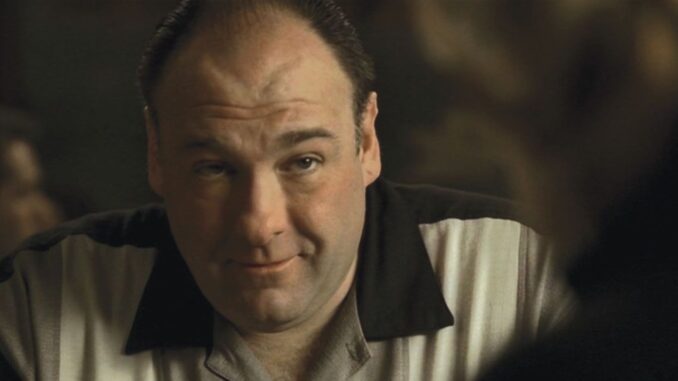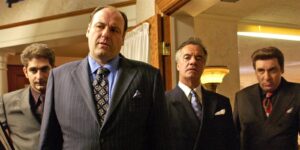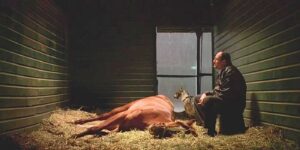
From 1999 to 2007, The Sopranos spanned six seasons and eighty-six episodes, forever altering the fabric of television. Often referred to as one of the greatest TV shows ever created, the series wasn’t for the faint of heart. Audiences learned not to become attached to characters early because no one was irreplaceable in the New Jersey mob drama.
Many character deaths were inevitable due to greed, disrespect, or liability, but amid the rising body count, there were devastating instances of fallen innocents (or innocent-adjacent). Multiple beloved organized crime members who possessed redeeming qualities didn’t live to see the final episode, but at the end of the day, they were violent murderers. Here are some poor souls who were either grandfathered in, naive, or in the wrong place at the wrong time.
An old family friend of Tony’s (James Gandolfini) father, Hesh Rabkin (Jerry Adler), is a former record executive who serves as Tony’s informal advisor. Tony takes out a $200,000 bridge loan from Hesh, which he doesn’t repay on time, resulting in a nagging weekly $3,000 vig. As the mob boss becomes increasingly irritated by Hesh’s repayment inquiries, Hesh begins to fear for his life.

Audiences had become acquainted with Hesh’s longtime girlfriend, Renata (Lanette Ware), in episodes preceding “Chasing It” and were shocked to witness her sudden death. As he conducts nightly bedtime rituals, Hesh talks to an off-screen Renata, who is already in bed. When he realizes she isn’t responding, Hesh walks into the bedroom to find her lifeless body. Hesh might not make fan-favorite character lists, but he is an old man, and the woman he loves has died. Renata’s death is believed to have been a stroke, but never underestimate Tony’s reach.
Loyal Soprano Family soldier Eugene Pontecorvo (Robert Funero) inherits two million dollars and would like to relocate his family to Florida and retire from his life of crime. Desperate to execute this plan, Eugene approaches Tony with gifts and a cut of his inheritance. After whacking a delinquent borrower at Christopher’s (Michael Imperioli) request, Tony’s fickle nephew swears to say a good word regarding the “Florida thing.”
After Tony reminds Eugene that he “took an oath,” his odds of making it to Sunny Florida decrease significantly. However, the would-be retiree was optimistic following the “favor” (murder) he carried out for Christopher. Unfortunately, Tony passes the buck to Silvio (Steven Van Zandt), who informs Eugene that he will remain a mobster– in New Jersey. Dejected, Eugene returns home to an unimpressed wife and a teenage son with a drug addiction. Audiences watch in horror as Eugene chooses his exit strategy.
Vito Spatafore (Joseph R. Gannascoli) flees New Jersey for New Hampshire following eyewitness accounts of his homosexuality in previous episodes from Season 6. Though Vito is one of Tony’s top earners and a ‘Made Guy,’ he’s also married to fellow mobster Phil Leotardo’s (Frank Vincent) second cousin. Humiliating Phil and his family in this manner is punishable by death. Vito briefly gets to live freely but is overcome with boredom and flees New Hampshire.
In his haste to return to Jersey, Vito carelessly rounds windy rural bends while nursing a bottle of vodka. He smashes into a parked Jeep Wagoneer owned by a man (Guy Paul) who refuses Vito’s cash repair offer and wants to report the accident through proper channels. In a scene reminiscent of Jackie Jr.’s final moments, Vito kills the man execution style. While audiences weren’t invested in the Jeep Guy, his death was tragic and unnecessary. The same can be said for Vito’s death in the next episode, “Cold Stones.” Live free or die, indeed.
Christopher and Paulie’s (Tony Cirico) usual cantankerous banter ratchets up several notches when the pair argue about their Pine Barrens field trip details. Christopher is increasingly annoyed by the time-honored tradition of the lowest-ranking member of a mob family picking up the tab. After a large gathering at a restaurant where Paulie intentionally ordered excessively, the two hotheads have a heated exchange in the parking lot. Perhaps unaware of who was seated in his section that evening, the waiter (Bill Quigley) interrupts Christopher and Paulie’s quarrel with inquiries about the bill.
The mobsters don’t take kindly to the waiter’s inadequate tip inference (or any remarks at all, really), and Christopher launches a rogue brick at the man’s head. The waiter’s head injury results in a seizure, and a panicked Paulie shoots him. To guarantee a spot in Hell, they take Christopher’s $1200 cash payment for the bill (he left the guy an insulting $16 tip) from the dead man and run. The incident precipitated apologies and a truce between Paulie and Chrissy, but who will feed the waiter’s children now? RIP, bold food industry employee.
One evening, while preparing for bed, Carmela (Edie Falco) offhandedly delivers news of Tony’s former “Amour Fou,” Gloria Trillo’s (Annabella Sciorra) suicide. Tony is visibly impacted upon hearing that she’d hanged herself from a chandelier but shields his reaction from his wife. The following day, Tony meets with his therapist, Dr. Melfi (Lorraine Bracco), who assures him that neither one of them is to blame for Gloria’s death.
Graciously, audiences did not witness Gloria’s last moments on screen, but Sciorra’s Primetime Emmy-nominated performance of the character permeated. Tony’s tumultuous yet passionate fling with the Mercedes Sales Associate was memorable because of Sciorra’s fearless portrayal. Though self-destructive and sometimes volatile, Gloria was charismatic and might have benefited from a greater support system than a philandering mob boss and sporadic counseling. She didn’t put Carmela in that E-Series Wagon, but damnit, she tried.
Series-long fixture and Satriale’s sandwich enthusiast, FBI Agent Harris (Matt Servito), warns Tony of an impending attempt on his life, igniting a chaotic chain of events. In the series’ penultimate episode, “The Blue Comet,” Tony directs his crew to a safe house, but the murdering wheels are already in motion. After a botched attempt to strike the Lupertazzi family first, Bobby’s trip to the train store becomes his last.
Bobby “Bacala” Baccalieri (Steve Schirripa) was a gentle gangster, content to dutifully oversee Junior Soprano’s (Dominic Chianese) loan shark business. Though his father, Bobby Baccalieri Sr., was considered ruthless in the mob scene, Bacala was mild-mannered and polite. The devoted father and husband wanted to tinker with his model trains and keep his head down, but Phil Leotardo ensured he’d never wear his conductor’s hat again. Fans of the show were shocked by Bacala’s violent end, but at least he went down surrounded by choo-choos.
Adriana La Cerva (Drea de Matteo) doesn’t ask for much. She lives in a sparsely decorated one-bedroom apartment with her temperamental boyfriend, Christopher Moltisanti (“Christapha,” to Adriana), and she knows the deal. During the hours her man spends elsewhere (or in other women’s beds), Adriana can rely on her best friend and constant furry companion, Cosette– until she can’t.

Christopher’s heroin addiction was not a new problem, but his actions in “The Strong Silent Type” made it everyone’s problem. When Adriana returns to the apartment to take Cosette for a walk, she calls for the ‘tiny thing’ with no luck. A horrible scene unfolds as she locates the lifeless little dog under the dead weight of a strung-out Christopher on the sofa. Bereft, Adriana sobs as her reckless boyfriend says, “She must’ve crawled under there for warmth!” Later, at Christopher’s intervention, Tony learns of Cosette’s untimely death and threatens to suffocate Christopher, echoing audience sentiments.
The episode “University” begins innocently enough by depicting Meadow Soprano’s (Jamie-Lynn Sigler) college experiences. However, audiences soon become acquainted with Ralphie’s (Joe Pantoliano) Bada Bing! stripper side-piece, Tracee (Ariel Kiley), and her growing dilemma. Tracee forgets her place and implements a public tone Ralphie cannot abide. In a gross exaggeration of punishment, the young woman’s time runs out before her twenty-first birthday.
In a show where random acts of violence are commonplace, the brutality that befalls young Tracee shocked viewers. Ralphie’s mother-to-be was a sweet girl who was serious about oral hygiene and presented Tony with baked goods in exchange for his sage advice. After witnessing the innocent child-like interactions between Tracee and Tony (followed by her grisly murder), audiences knew Ralphie’s time was limited. It didn’t help matters that Ralphie claimed she’d died because she tripped, as she was a “klutz.” The Kinks’ tune, “Living on a Thin Line,” plays as the end credits roll, and for Tracee, no truer words have been spoken.
Adriana is backed into a corner with the FBI, and the only way out is through. After bouts of debilitating ulcerative colitis brought on by extreme stress and anxiety, the beloved Sopranos character finally confides in Christopher. Rather than wear a wire and entrap her fiancé, Adriana is allowed to deliver Christopher to the FBI under a time constraint. The couple filters through shock, rage, sadness, and fear as the world as they knew it disintegrates.
In Primetime Emmy award-winning performances, Imperioli and de Matteo left their mark on the series in “Long Term Parking.” Adriana wasn’t the brightest crayon in the box but was charismatic and held her own in a dog-eat-dog environment. Audiences were grateful for Adriana’s optimism and entrepreneurial spirit; she added much-needed levity and proved that no outfit was ever tight enough. Viewers watched in rapt disbelief as the man she risked her life for didn’t respond in kind. As Silvio sped towards Adriana’s final destination, fans offered a tearful farewell.
In the pilot episode, a family of ducks introduces audiences to Tony Soprano’s fondness for animals. His perfunctory indifference to inflicting or witnessing human violence and murder acts as an unsettling internal moral counterweight to his ASPCA membership. It came as no surprise when garbage human Ralphie Cifaretto’s racehorse, Pie-O-My, fell ill, and he’d rather see it die than pay for its care. After coming to Pie-O-My’s aid, Tony sat vigil (with a stable goat) and quickly became devoted to the horse. Later, a stable fire and severe burns would require the euthanasia of Tony’s majestic friend and open Pandora’s box of mismanaged mob hierarchy protocol.
Tony isn’t an overly sentimental gangster, but he is capable of grandiose displays of kindness and exaltation– in the name of an animal. The ducks were great, but Pie-O-My was a splendid specimen capable of generating repeated revenue. The joy Pie-O-My brought to the violent criminal was nearly touching, which is why his death rocked viewers to their core. However, during a session following Pie-O-My’s demise, Dr. Melfi’s approach was surprisingly callous, as big alligator tears rolled down the mobster’s cheeks. Her response to Tony’s tearful reenactment of receiving his commissioned Pie-O-My painting, “That being said, it was a horse,” was ice-cold. Meanwhile, Tony’s (over)reaction to Pie-O-My’s death and subsequent murder (and dismemberment) of Ralphie was the beginning of the end for everyone’s favorite antihero.
